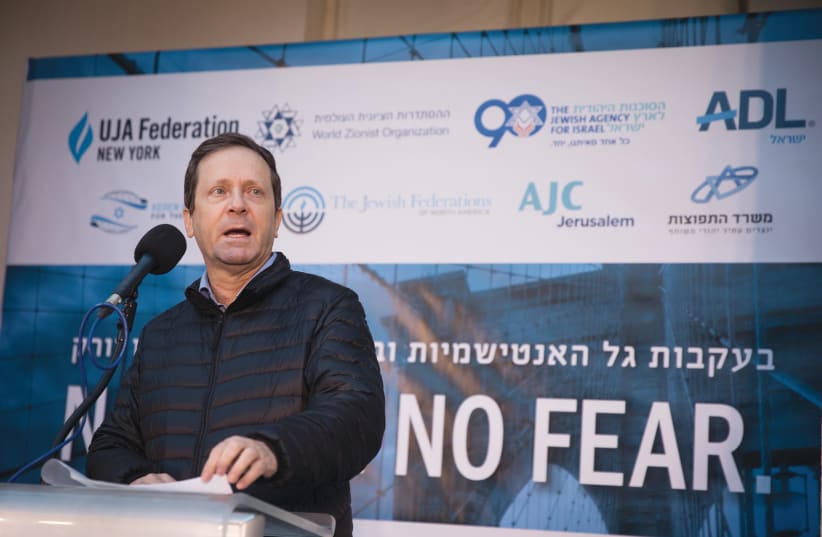Legend has it that when David Ben-Gurion was serving as chairman of the Jewish Agency for Palestine (the predecessor of today’s Jewish Agency for Israel) during Israel’s pre-state era, an American Jewish philanthropist told the future prime minister he that loved Israel so much that he named his vacation home outside of Chicago “Palestine.”
Ben-Gurion responded, “Why don’t you have a summer house in Tel Aviv and call it Chicago?”
Nearly 75 years later, so much has changed, but two things have not.
First, the relationship between American Jews and Israelis continues to be a work in progress, with warm feelings of affection but different points of view, marked by frequent failures to understand each other’s perspective.
And second, the agency’s role of serving as a unifying force is of nearly existential importance to maintaining that relationship.
It is therefore perhaps not surprising that the agency’s search for our next chairperson has received an unprecedented amount of media attention both in Israel and in the Jewish media.
The selection committee is doing more than choosing the next head of the largest not-for-profit Jewish organization in the world. It is selecting a person who will be sitting in David Ben-Gurion’s actual office at a time of significant anxiety about the connections between the world’s two largest Jewish populations.
Most of us did not need to read the latest (almost monthly) breathless account from The New York Times about the “unraveling” of American Zionism. The recent Pew Research Center findings on US Jewry paint the picture in a far more nuanced but equally clear manner. While a clear majority (over 60%) of American Jews continue to feel close to Israel, those numbers are considerably lower among those under 30, with only 35% answering that caring about Israel is essential to them, and 27% stating that Israel is not an important part of being Jewish.
Those of us who care about this relationship have a lot of work to do in both the US and Israel.
Looking at America, while there are many complicated layers to this challenge, one fact remains incredibly simple, and is supported by every single study that has been conducted on the issue: the more contact American Jews have with Israel, the more likely they are to feel a connection. This is intuitive: If you go to Israel for a week, you are likely to feel more connected than if you did not. If you go for a few months, you will feel even more connected.
Yet not every American Jew will come to Israel, and that is why the agency does all that it can to bring Israel to them.
This mission is accomplished through our shlihim (emissaries), who spread awareness and education about Israel in their service for thousands of institutions across world Jewry; school twinning, which bridges the distance between students from different cultures and continents; and the Partnership2Gether program’s city-to-city and region-to-region collaborations between Israeli and North American communities. We are honored to work with individual Jewish federations across the country as well as the Jewish Federations of North America in these efforts.
YET, ANY healthy relationship must be reciprocal. We must be honest with ourselves that far too little time and resources have been invested in educating Israelis about American Jews.
Indeed, it can be fairly said that the spirit of Ben-Gurion’s quip has been the dominating thought in much of Israel’s society.
All too often, when Israeli children learn about Jews outside of Israel, they are learning about tragedies like the pogroms, the Holocaust, and the Farhud. Israelis should continue to learn the stories of these tragically murdered Jews, but they need to also give more attention to those of us who are alive and have consciously chosen to live as minorities.
The new head of the agency must devote him/herself to this effort. They will find ready allies. Over the last few weeks, I have had the honor and genuine pleasure of joining Israeli comedian Guri Alfi in Boston, Chicago, Los Angeles, New York and San Francisco to talk about his revolutionary series, The New Jew.
It’s a delightful, much-watched comedy miniseries on Israeli public television, exploring the diversity of American Jewish life – the first Israeli television show about American Jews in over a quarter-century.
Alfi showcases our Jews of color, our women rabbis and our somewhat incoherent but lovable Jewish fraternity members in a thoughtful and affectionate way. In bringing us into Israeli living rooms, Alfi has done an immeasurable service to building greater bridges of understanding.
But it is not enough. Our goal must be nothing less than assuring that every single Israeli student receives a greater level of knowledge about world Jewry. Only the new head of the agency is capable of leading an effort of this nature.
One thing is certain: The next head of the agency will stand on the shoulders of giants. From Ben-Gurion to Natan Sharansky to Isaac Herzog, the agency’s past leaders have wrestled with the fundamental challenges facing Israel and the Jewish people.
While there is much at stake, the new head will find hundreds of committed colleagues, lay leaders and partners who cannot wait to take on the challenges of today.
The writer is head of North America at the Jewish Agency and president and CEO of Jewish Agency International Development.

